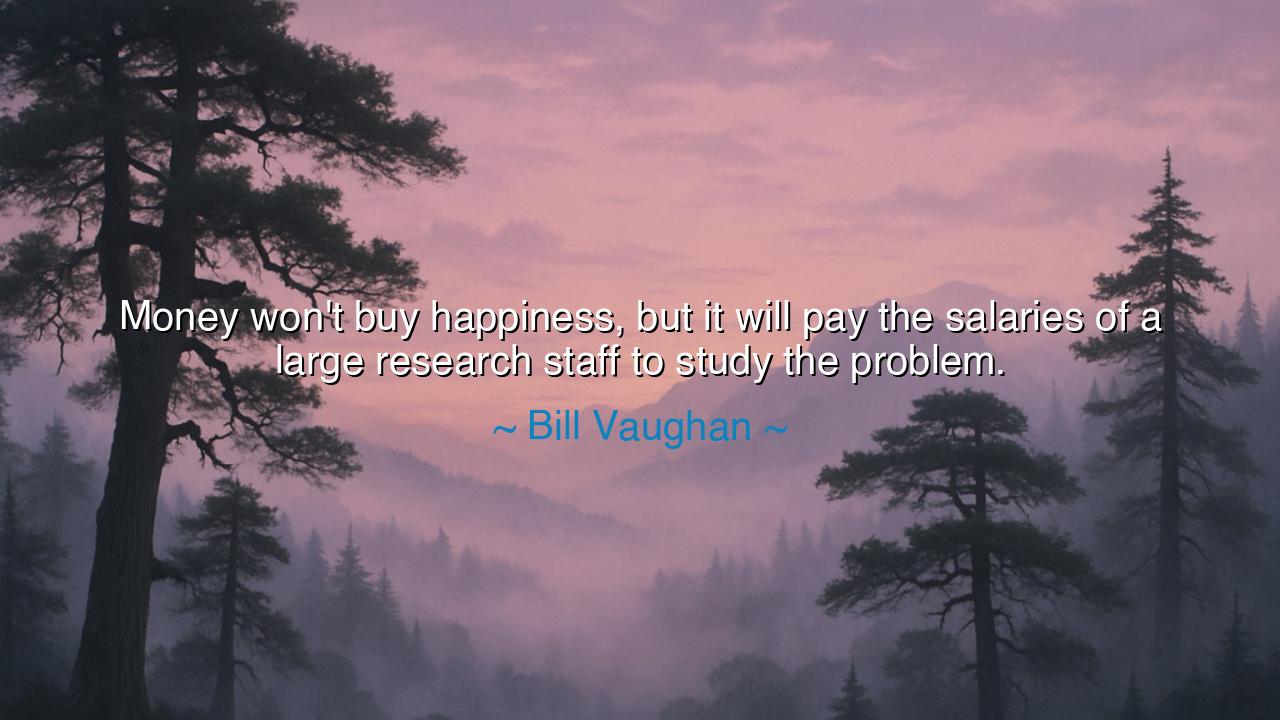
Money won't buy happiness, but it will pay the salaries of a
Money won't buy happiness, but it will pay the salaries of a large research staff to study the problem.






"Money won't buy happiness, but it will pay the salaries of a large research staff to study the problem." These words, spoken by Bill Vaughan, carry both a wry humor and a profound observation about the relationship between wealth and human well-being. Vaughan, with his clever wit, points out that while money may not directly provide happiness, it does enable the pursuit of understanding the very nature of happiness. Money can fund research, create opportunities, and provide the tools to explore what truly matters in life, but it does not grant us the deeper, more lasting fulfillment that so many seek. In essence, money can help us answer the question of happiness, but it cannot provide the answer itself.
In the ancient world, philosophers pondered the same questions that Vaughan's quote touches upon. Aristotle, in his work Nicomachean Ethics, contended that happiness, or eudaimonia, is the highest good—a state of flourishing achieved through the pursuit of virtue, not material wealth. For Aristotle, wealth was simply a tool to support a virtuous life, not the end goal. To Aristotle, money was neither the cause of happiness nor its ultimate purpose; instead, happiness came from living a life in accordance with reason and fulfilling one’s potential. Yet, like Vaughan, Aristotle recognized that resources, including money, are often necessary to pursue the higher purposes in life, including the search for meaning, understanding, and happiness.
Consider the example of Alexander the Great, whose military conquests and accumulation of wealth were legendary. Despite his great success, Alexander was not content in the way we might imagine. The wealth and power he amassed did not bring him the inner peace or contentment he may have sought. Instead, his quest for power led him further into a spiral of ambition and unrest. His story echoes Vaughan’s sentiment: money and power did not bring him the happiness or fulfillment he longed for. Rather, his pursuit of glory and dominance ultimately left him restless and searching for meaning in a world that only offered more conquest and more wealth.
Similarly, the tale of King Midas from Greek mythology offers a timeless lesson in the dangers of pursuing wealth at the cost of happiness. Midas, granted the power to turn everything he touched into gold, soon found that his gift was a curse. His wealth, though immense, isolated him from the joys of human life—the ability to enjoy food, the touch of loved ones, the simple pleasures of existence. In the end, money, even in its magical form, proved to be empty. Midas learned the painful lesson that wealth alone does not bring happiness, and that the pursuit of material gain can lead to loss and emptiness.
Vaughan’s quote, while humorous, reveals a deeper truth about the human condition. In today’s world, where the pursuit of wealth and status often dominate our goals, it is easy to forget that true happiness cannot be bought or sold. The abundance of research into the science of happiness—from psychology to neuroscience—is a reflection of the fact that we continue to seek an answer to the question of how we can live meaningful, fulfilling lives. Despite all the resources we have to study the problem, the answer remains elusive. Happiness, it seems, is not a commodity that can be captured by scientific inquiry or purchased with wealth.
The lesson to take from Vaughan’s words is one of balance and perspective. While money can certainly open doors and provide opportunities, it is not the source of true happiness. We must recognize that the pursuit of material wealth should never overshadow the pursuit of inner peace, meaning, and virtue. Instead of looking to wealth as the ultimate solution, we must look inward and cultivate the qualities that lead to a flourishing life: gratitude, connection, purpose, and generosity. Money can help us explore what makes life meaningful, but it cannot be the ultimate answer.
In practical terms, this means shifting our focus from the accumulation of material wealth to the cultivation of inner wealth. We must invest in our relationships, in the development of our character, and in the pursuit of what truly brings joy and fulfillment. The research into happiness may continue, but we must remember that the answers often lie within our own hearts, minds, and actions. Let us seek wealth not just in material goods, but in the rich, rewarding experiences of life that cannot be bought, but only earned through virtue and self-awareness.






AAdministratorAdministrator
Welcome, honored guests. Please leave a comment, we will respond soon